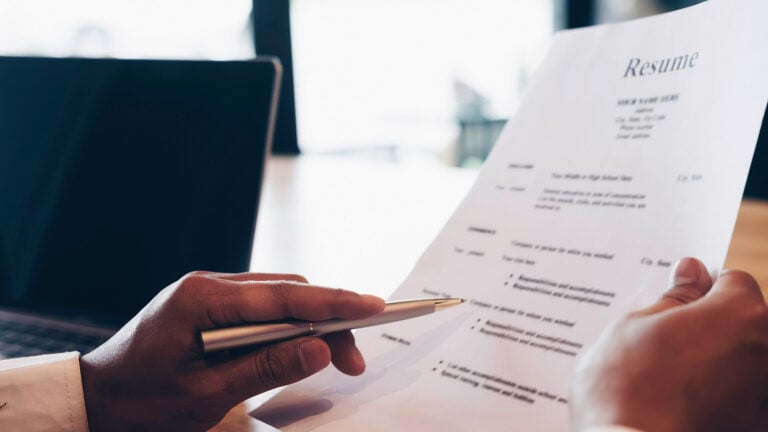It seems almost incredible how body language has become an active aspect of human personality. Although most people still believe speech is the main communication form, body language’s importance is still indispensable. Before discussing body language’s role in an interview, you must know the relevance of body language skills in daily life. A name like Charlie Chaplin doesn’t need an introduction, owing to his communication through body language as a silent-movie actor.
Anthropologist Ray Birdwhistell pioneered the original study of nonverbal communication- kinesics. His analysis found that the verbal component of a face-to-face conversation is less than 35 percent, and over 65 percent of communication is done nonverbally.
Now that you have learned the importance of body language, let us get a step ahead. We have highlighted your body language’s pivotal role during an interview.
ALSO READ:
Role of Body Language in an Interview
#1. Reflects your personality
The manner in which you present yourself depicts your personality. Companies nowadays look for candidates with strong personalities, suitable skill sets, and education.
Not every person who is book smart will propel professionally. In fact, people with the right attitude toward work and a presentable personality can do wonders in a professional setup. That being the case, you must consider working on your body language and put forward your best profile highlights.
#2. Separates you from mediocre candidates
Your body language tells a lot about your exceptional personality. To get your point across effectively, you can master using your body posture. As an outcome, you can see yourself a notch higher than other candidates.
If you hone your body language skills, you will never settle for less and strive to give your best in an interview.
#3. Echoes your professional attitude
One primary reason why body language plays a vital role during an interview is that it showcases your professional attitude. Hiring managers can judge how you will act during your course of employment from your body language.
An important aspect you must consider here is to adjust your body language to suit your field.
#4. Displays your attentiveness
Your communication through body language lets the recruiter know whether you are attentive. And this decides your fate. If you are attentive to the minute of things and show it through your body language in an interview, nothing can stop you from moving to the next recruitment stage.
Additionally, hiring managers look for candidates who have a large attention span. You can depict your attentiveness in an interview by having the proper body posture, maintaining eye contact, and speaking confidently.
#5. Shows that you are a keen listener
Presenting yourself as a keen listener with good comprehension skills isn’t enough. Unarguably, it’s not sufficient to understand what the interviewer is asking, but you must also answer them wisely. Moreover, answering them with just words won’t suffice for the purpose, and you must use gestures and facial expressions, too.
Even if you know all the answers but aren’t confident enough, you won’t be able to sail through the hiring process.
Pivotal Aspects of Body Language You Must Remember
During an interview, there are a few things you must remember. Let’s go through them.
-
Keep your back straight – Understand the term body language and make sure to follow the rules. Keep your back straight, and don’t let it slouch.
-
Have your legs crossed – You should keep your legs crossed to depict the correct body language in an interview. Make sure you don’t shake your legs or twist your toes.
-
Make apt gestures – Making thoughtful gestures can make you come across as a good orator used to public speaking. For instance, nod your head to show your attentiveness and to affirm your listening skills.
-
Maintain eye contact – Don’t avoid maintaining eye contact, and be confident of your abilities and skills.
-
Upkeep the right tone of voice – Sync your tone of voice with what you want to convey to create a good impression on the recruiters. Keep your words, actions, body language, and tone of voice in a way that compliment one another.
Bottom line
Body language is essential to what you wish to convey to the interviewer. Interviewers have observed that bad interviews often contain little to no use of body language. You may leave a negative impression in the recruiter’s mind if you do not exhibit the correct body language. Therefore, it is imperative to acknowledge the role of body language in an interview. While it may seem like a minute thing, body language will set you apart from the crowd.
It’s important to note that body language can vary across cultures and individuals, so it’s crucial to be mindful of contextual cues and adjust accordingly during an interview. Being aware of and managing your body language can help you convey a positive impression and enhance your overall communication during the interview process.
Deborah Bull quotes it well: “Body language is a very powerful tool. We had body language before we had speech, and apparently, 80% of what you understand in a conversation is read through the words, not the body.”
Our team of specialist recruiters advocates that candidates must perfect their body language. Not only will your education, skills, and knowledge land you the right job, but it will also take having the correct body language.
RELATED READ: Top 9 Candidate Screening Questions Recruiters Ask
FAQs
1. What are the five types of body language?
In an interview, job seekers and employers communicate through verbal responses, nonverbal cues, or body language. Here are five types of body language that can be observed in an interview:
-
Facial expressions convey feelings of joy, sadness, sorrow, anger, fear, or surprise.
-
Eye contact indicates the level of interest or attention.
-
Gestures can have varied meanings across the globe.
-
Voice to make people listen not only to your words but emotions.
-
Posture refers to the way you move and carry yourself.
2. How do you assess body language in an interview?
Assessing body language in an interview requires careful observation and interpretation of nonverbal cues. To assess body language in an interview, you can:
-
Observe extreme behaviour
-
Spot the difference
-
Connect the dots
-
Ask follow-up questions
It’s important to note that body language cues are not always definitive and can be influenced by various factors. Therefore, it’s essential to consider them as part of a holistic assessment.








